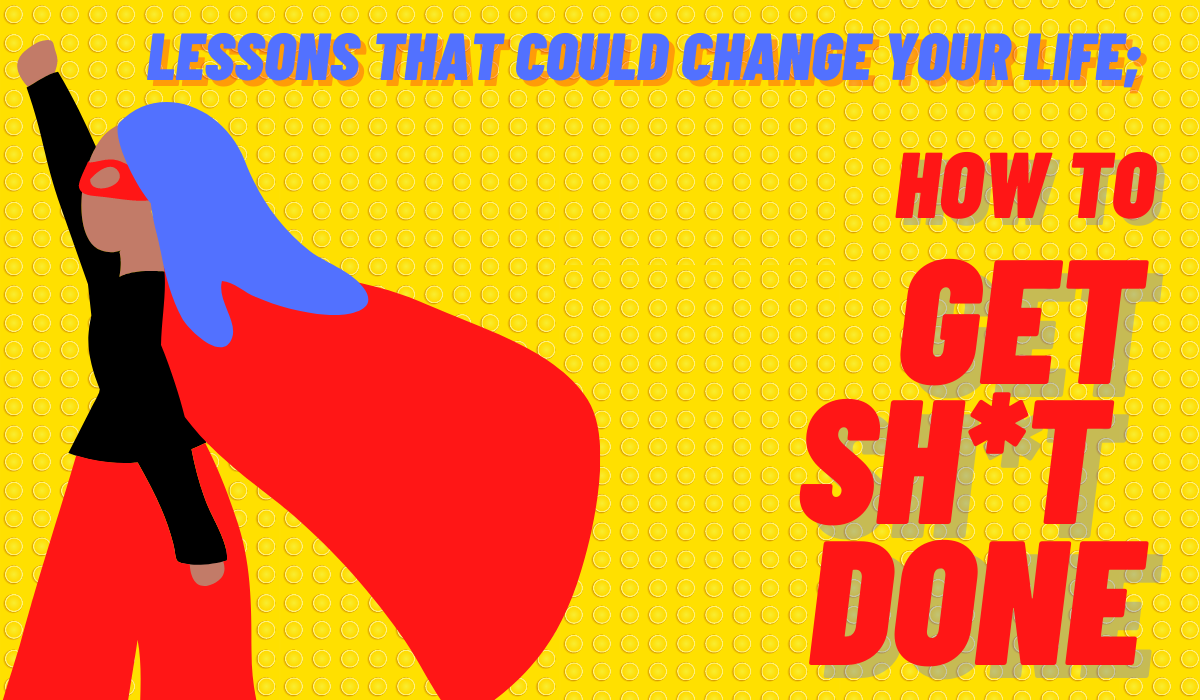Lessons that could change your life

If I boiled down my twenty-five years to twenty-five key takeaways this series of articles is what they would be. The following is a summary of what I hope will be useful lessons you can come back to on days you need to dig deeper and be more.
Now, twenty-five is a lecture so I’ve broken it down into five thebraincandigestthis sized chunks as follows;
Chunk 1: How to get sh*t done
Chunk 2: Fundamentals to self development
Chunk 3: Pushing past limits
Chunk 4: Tools to socialisation
Chunk 5: Mindset
This article isn’t going anywhere anytime soon so if five is too big to digest, don’t worry. Use the ones that relate to you most today, the others will be here to come back to tomorrow.
How to get sh*t done
Fail, don’t fear.
Why do we fail at pursuing our dreams? For many of us, before we’ve even stood up off the couch we’ve created a complex, subconscious, multi-layered excuse in our heads. Each of those excuses is compounded onto the next. They’re played out at light speed and before we know it we’re drawing conclusions. What I imagine is that in some deep dark pit in the basement of that skyscraper of excuses we’d find the fear of failure.
There’s 10001 books and quotes about it but I still struggle with this concept everyday. I live in fear of judgement from others and of myself. Try asking yourself ‘What have I got to lose If I do, and what have I got to lose if I don’t?’. A lesson I took from Mark Manson’s book ‘The subtle art of not giving a fuck’ (high on my list of recommended self help books) if you try and you fail you can only end up where you began in the first place. If you don’t try at all, you’ll spend eternity asking yourself ‘what if?’.
So, fail (learn) and fail again. [ Just incase this ramble hasn’t yet made it clear enough, the aim isn’t to fail but to try and in order to try, you shouldn’t fear failing].
Don’t rely on motivation to get things done
I’m talking about the days when you wake up and feel ready to tackle all 73 items on your to-do list. The kind of day which is so productive it makes up for months filled with ‘netflix and chill’. If you’re anything like me the flaw with relying on those days is if they’re few and far in between. We can’t spend 98 percent of our lives waiting and not doing.
The solution? Timetable in the pertinent things and stick to that timetable like a slug to a pebble. Yes, there are factors outside of you sphere of control that mean that maybe the schedule doesn’t always work but intent to try. Only choose to deviate from that timetable when it’s life or death.
Start now, not tomorrow
Get over that mental barrier. Don’t want till Monday. Don’t wait till the clock strikes the next hour exactly. Don’t wait till the first of the month. Stop waiting for everything to align perfectly and to feel prepared. The moment you think of it is the moment to begin. Sometimes, the only thing to do is put on your raincoat and gummy boots and go out for that walk.
The 1% rule
When we set news goals for ourselves we tend to think about the end result. We try and dive into the deep end, look at the overall picture and we tell ourselves to push through the rest.
The 1% rule as described in Atomic Habits by James Clear (another book on the highly recommended list) is about the ‘aggregation of marginal gains’. Think of your end goal, break it down into bite-sized chunks, then improve each of those chunks by 1% everyday.
Today, I’m recovering from an injury. I want to become a runner by the end of the year. My goal is to run 15km in 1.5 hours. The chunks are as follows:
- Ankle strength and rehabilitation : I can improve this by 1% everyday by ensuring I do my physio, roll-out tight muscles to avoid further injury and listen to my body.
- Cardiovascular stamina: I can work on my cardiovascular stamina without straining my ankle and as it recovers by swimming or cycling.
- Gear: I can trial different ankle supports and shoes to see if any suit me best.
- Routes: To avoid boring runs, I can pre-plan routes using apps like Strava.
- Bad weather: I can ensure I have appropriate gear to allow me to run in bad weather.
- Motivation: here’s where the next lesson comes in
Were the last 24 hours worth it
Finally, if none of the above works, this one might just guilt you into achievement. Every night, when you get into bed, stop and ask yourself ‘were the last 24h worth it?’ ; Did you use your time well? You might start to anticipate that heart wrenching feeling you get as crawl into bed knowing you’ve wasted the day and just like that you start getting sh** done.


